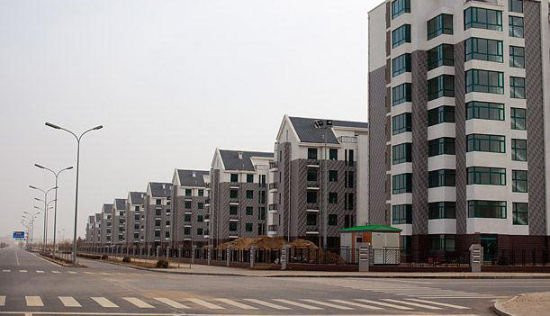Housing sales, prices, investment and construction are all down in 2023
Dikang, chinaworker.info
China’s property crisis shows no signs of bottoming out. In 2021, 18 trillion yuan (US$2.46 trillion) worth of property was sold in China, according to economist Hao Hong. But in 2023, to achieve total sales of ten trillion yuan (US$1.36 trillion) would be “lucky” he told CNBC.
The collapse of history’s biggest ever housing bubble threatens to drag the Chinese economy into many years of stagnation. Acting like a giant brake, the property slump is the major reason that the economy failed to rebound after three years of brutal pandemic controls ended.
On one side there is chronic oversupply of housing, alongside a demographic crisis. Urbanisation has slowed down. Property companies accounting for 40 percent of the market have now defaulted on their loans. The capitalists overleveraged themselves believing the market could only go upwards. In 2021, the bubble began to burst with the debt crisis at Evergrande. Its boss Hui Ka Yan and several other Evergrande officials have now been arrested. This could presage a government-led dismantling of the company. What effect this would have on the wider economy is not clear.
Vacant apartments
In a video from an economic forum in Dongguan on 23 September, He Keng, a former deputy head of the National Bureau of Statistics, suggested that even China’s whole population of 1.4 billion would not be enough to fill all the vacant properties across the country.
He’s speech was a reference to the staggering scale of over-construction which has occurred. This is because of rampant financial speculation which created a gigantic bubble in the housing market.
“How many vacant homes are there now? Each expert gives a very different number, with the most extreme believing the current number of vacant homes are enough for 3 billion people… That estimate might be a bit much, but 1.4 billion people probably can’t fill them,” He told the Dongguan audience.
Previous estimates have ranged from 65 million to 80 million vacant housing units in China. He’s remarks suggest even these numbers are an underestimate.
Therefore, what is now happening in China is well and truly crazy. Karl Marx and Friedrich Engels explained this process 175 years ago: “In these crises, a great part not only of the existing products, but also of the previously created productive forces, are periodically destroyed. In these crises, there breaks out an epidemic that, in all earlier epochs, would have seemed an absurdity – the epidemic of over-production”. [Marx and Engels, The Communist Manifesto]
‘Japanification’
Xi Jinping’s regime looks paralysed in the face of this crisis. In recent months, CCP authorities at national and provincial levels have announced more than 200 different but piecemeal measures in an attempt to revive the housing market. In September there was a pickup in housing sales of 17.9 percent compared to August, but this still marked a drop of 29.2 percent from September 2022.
Confidence in the CCP dictatorship’s ability to manage the economy has been shaken throughout society and among the capitalists inside and outside China’s borders.
Increasingly it looks as if China is trapped in a process of ‘Japanification’ as we have explained in Socialist magazine. This refers to the ‘lost decades’ experienced by Japanese capitalism following the collapse of a similar – but smaller – property bubble in the early 1990s. Japan, once seen as a ‘miracle economy’ that was poised to overtake US capitalism, flatlined. Its share of world GDP shrank from 18 percent in 1990 to less than 4 percent today.
There are differences between Japan and China, and when Marxists describe a process of economic ‘Japanification’ we do not mean China will replicate exactly the features of Japan’s crisis. For a more detailed explanation, see our article ‘China’s economy in the grip of Japanification’ from issue 71 of Socialist magazine.
China is different, but…
A recent Goldman Sachs report (October 2023) says that China’s property collapse actually looks more serious than Japan’s in some aspects. In China’s cities, vacant housing accounts for around 20 percent of the total, which is more than double the 9 percent rate of Japan in 1990. House prices are 20 times household income in China, versus 11 times in Japan in 1990, the report says. Property investment’s share of China’s GDP was also twice as big compared with Japan in 1990. Therefore, “the direct impact from a housing slump to the real economy would be bigger in China than in Japan,” the report says.
Economists like Hao Hong predict China’s housing slump will last for years or even a decade. Investment bank UBS expects property sales and construction to ‘stabilise’ at 50-60 percent of the peak reached in 2020-21. The sharp fall in housing construction will cause a chain reaction of more defaults, bankruptcies, job losses, budgetary crises for local governments and risks of contagion to the financial system.
“If not handled properly, risks in the housing sector are likely to trigger systemic risks – which is why prompt steps must be taken to address them,” former vice premier Liu He said in January at the World Economic Forum in Davos.
But there seem to be few “prompt steps” coming out of Beijing. Fears over China’s ‘Japanification’ will intensify.




